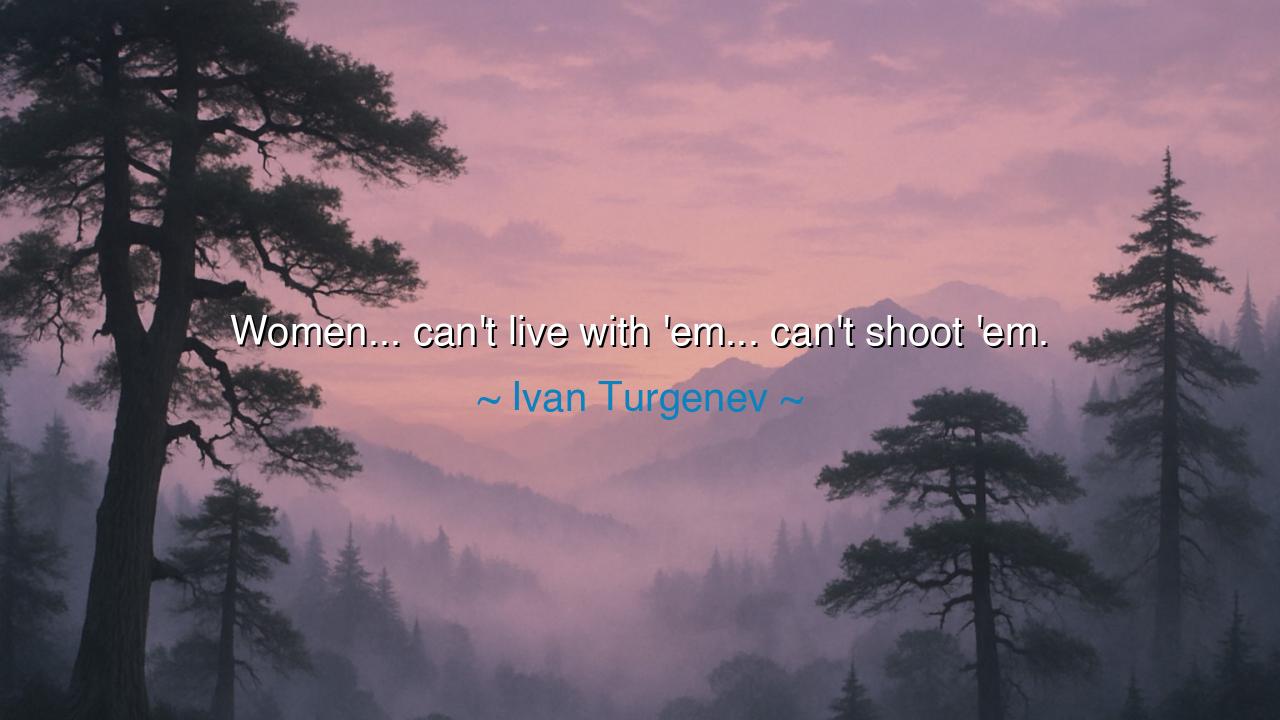
Women... can't live with 'em... can't shoot 'em.






Ivan Turgenev, the great Russian novelist, once uttered with irony and weariness: “Women… can’t live with ’em… can’t shoot ’em.” Though spoken in jest, the phrase hides the eternal riddle of human bonds—the tension between man and woman, desire and frustration, intimacy and freedom. In these words lies both complaint and confession: that women, with their mysteries, are difficult companions, yet utterly indispensable. To remove them would be to destroy life itself.
The origin of such a quip comes from Turgenev’s own life, a man often entangled in love, admiration, and sorrow over women he could neither fully possess nor wholly abandon. His long devotion to the opera singer Pauline Viardot, a love unfulfilled yet unbroken, revealed the paradox he expressed: the pull of attachment bound to the sting of distance. The humor of the saying masks a deeper truth—that men and women are locked in a dance where harmony is fleeting, but separation is unbearable.
History itself bears witness to this paradox. Consider Antony and Cleopatra, whose passion shook empires. Antony, bound by love, found both torment and triumph in Cleopatra’s presence. To live without her was impossible; to live with her was to be consumed. Their story reflects Turgenev’s irony: the relationship was filled with turmoil, yet neither could sever the bond without losing themselves. In this way, the saying reveals not disdain but the complexity of human connection.
Turgenev’s words also echo the ancient recognition that conflict and love are intertwined. Man rails against woman’s unpredictability, her strength, her demands, yet he knows that she is the source of life, of continuity, of joy. The quip “can’t shoot ’em” is not literal but satirical—it points to the futility of imagining a world without women, a world that would collapse into silence and sterility. Thus, even in complaint, there is reverence.
Therefore, O children of wisdom, take this jest not as scorn, but as a reminder: human bonds are forged in both joy and strife. Love is not easy, companionship not always serene. Yet it is precisely in the friction, the misunderstanding, and the persistence through struggle that the depth of life is found. For though men may laugh at the trials of living with women, they know in their hearts that without them, life would be unendurable.






KCLe Khanh Chau_0219
While the quote seems to be a lighthearted take on gender relations, there’s something troubling about the idea of seeing women as impossible to live with, and yet impossible to get rid of. Does this reflect deeper stereotypes, or is it merely a reflection of cultural attitudes toward women at the time? Could this be a critique of how men have historically viewed relationships with women, or just a casual remark about human nature?
UTuyen thuc
It's interesting how this quote uses humor to express the tension between men and women. I wonder, though, how often we see such perspectives portrayed in literature, especially as a way to simplify or poke fun at gender relations. Could there be a more constructive way of addressing these tensions that doesn't rely on jokes at the expense of understanding each other? How can we balance humor with respect in matters of gender?
PKPhan Kien
The humor in this quote comes across as both cynical and playful. It almost feels like a comment on the age-old struggle between men and women. Is this an expression of a timeless truth, or just a lighthearted jab at gender dynamics? Are we supposed to laugh at the difficulty of relationships, or is there an underlying critique of how people often trivialize the complexities of mutual understanding?
HHnguyen thi hong hoa
This quote seems to reflect a certain frustration or complexity when it comes to understanding relationships between men and women. Is this an exaggerated expression of conflict, or does it speak to the deeper challenges in human connections? Does it imply a love-hate dynamic, or is it highlighting the difficulty in finding harmony between the sexes? It certainly raises the question of whether relationships are often more complicated than they seem.